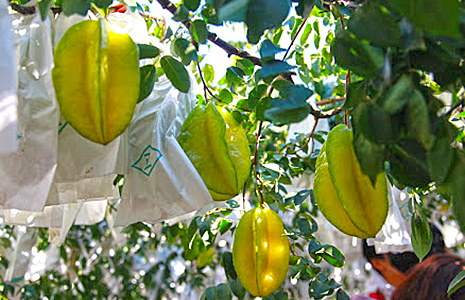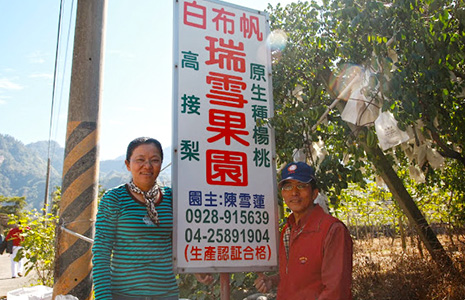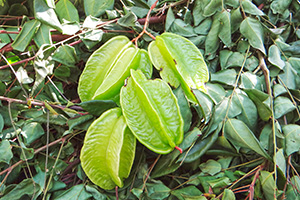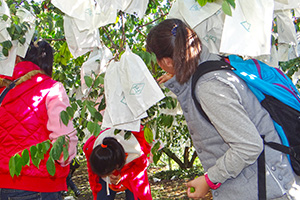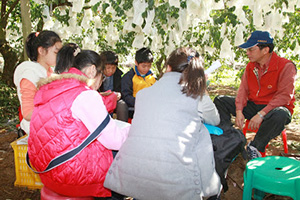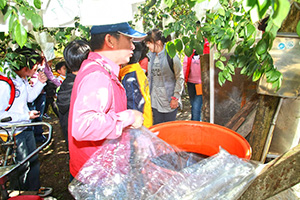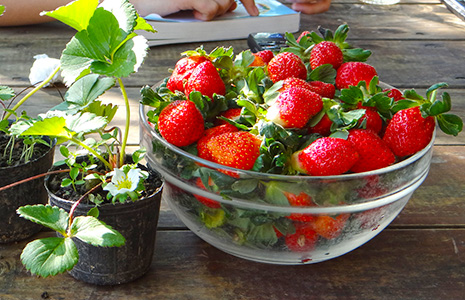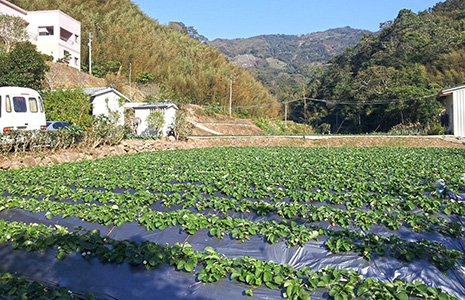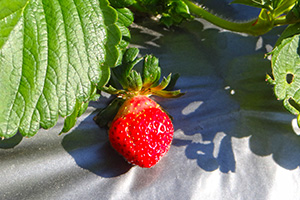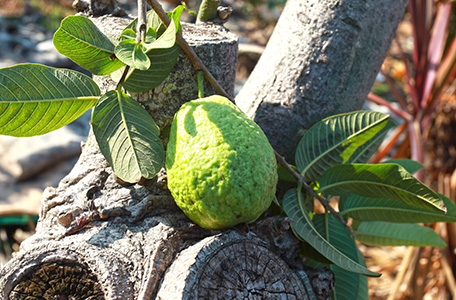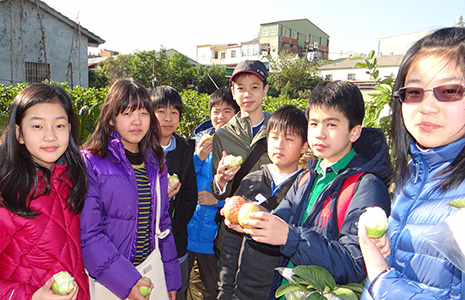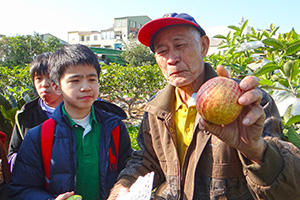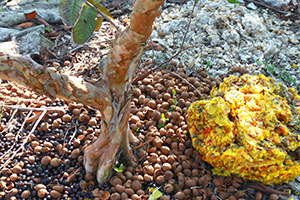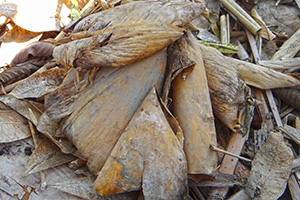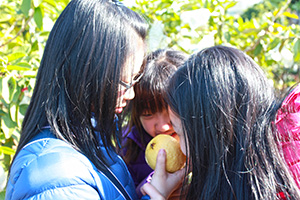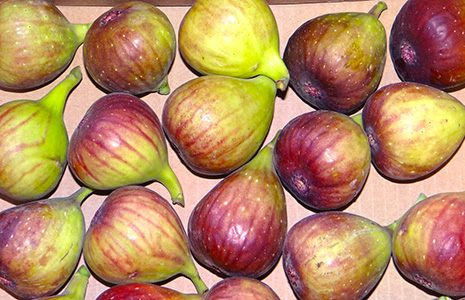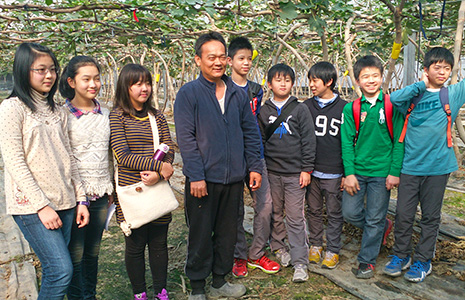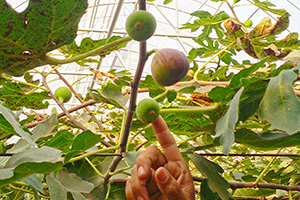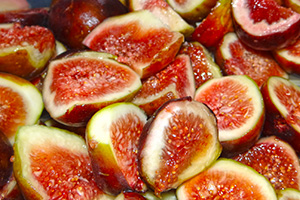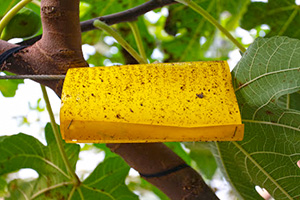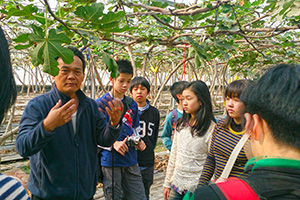 |
 |
 |
 |
 |
|||

This orchard is located in Baifufan, which is the only star fruit orchard which insists in planting Soft star fruit in the area. Baifufan is the farthest northern area that produces star fruit in Taiwan. The cool and low-temperature weather makes the growing speed of star fruit slower than other areas for one month. The slow growth gives the star fruit a fine pulp and juicy taste compared to a faster growing season in other areas. In addition, the humidity and cold east wind from the Snow Mountain circle in the valley, resulting in a drastic temperature difference between the daytime and nighttime. The star fruit here is covered with a thick layer of natural fruit wax, and has a unique fresh and sweet flavor.
In such excellent environment and climate, the orchard owner insists on toxin-free plantation, and harvests only three times in a year. The star fruit produced in the second harvest has the best quality. The fruit thinning rate is up to above 3/4, and the fruits with minor defects are removed. Only the fruits with plump look are left on the tree. Because of such persistence, the star fruits grown here are large and delicious. The star fruit branches are slender and are supported by the bamboo scaffolding, so we need to bend over while walking, and be careful not to run into the star fruits above our heads. Next, we visited the orchard owner. They are a couple with amiable and open personality. They take great pride in their star fruits. In addition to the good environment, they also use organic fertilizer to grow their fruit trees. All of their fruit trees look strong, and the fruits are naturally sweet and juicy. We enjoyed the star fruits very much. During our visit, the couple talked about their farming experience, and mentioned that their loyal customers would come to the orchard every harvest season. The orchard owners feel their hard work is worthwhile.
In the valley surrounded by mountains, there is Hao Shan Shui Strawberry Farm in Malabon. This mountainous area is secluded from the outside, thus is free from pollution. The strawberries here are irrigated with clean and natural spring water. At such a high altitude, the strong wind scatters the fog, so the weather is cold but not humid. Along with a great temperature difference between daytime and nighttime, full sunshine and semi-sandy soil, the strawberries planted here are sweeter and more delicious than other areas. The fruits are also very plump. In addition to the special geographical environment, Mr. Lai, the strawberry orchard owner, has his own organic cultivation method. He uses natural manure, and allows the earth to rest fully during the fallow period, so that the soil contains a large amount of organic organisms. The earthworms also soften the soil and make it air permeable. Under such natural cultivation, the strawberries have strong sweet aroma. The soil is also covered with coix seed shells, so that the tourists picking strawberries will not get their shoes dirty. It is a pleasant walk around the farm. Through this visit, we learned about Mr. Lai’s love in the strawberry farming and care for the environment. He and his family members removed the weeds manually every day. Their persistence comes from the belief to bring the natural and healthy taste of the original flavor of strawberry to the customers.
When we visited the guava orchard of Mr. Chiang, we were surprised that his small orchard produces the most delicious guava in Taiwan. The guava trees here are the main breeds from 1960s to now, including the earliest local selection of the Dongshan Yeba variety, as well as Century Guava, Honey Guava, Red Guava, Crystal guava, Thai Guava, Purple-jade Guava and Pearl Guava.) The most popular breed is the Honey Guava, which is famous for its strong flavor and fragrance. In fact, this Honey guava won Mr. Chiang the honor of the Shennong Award, the award for the best farmer in Taiwan. The orange color and fragrant guavas with fine pulp and soft mouthfeel is well known among fruit connoisseurs.
The thick bamboo shoots also attracted our attention. Mr. Chiang uses this natural raw material to cover the entire orchard, which can reduce weeds and provide more nutrients to the fruit trees. This is his secret of producing delicious guava. Although more efforts are needed to prevent and treat pests and diseases, Mr. Chiang believes that “it is the most natural way to use whatever comes from the land on the land”. He transports a cartful of sugarcane bark, cabbage leaves, cane shoots and bamboos shoots, and even the “agricultural residue” such as ash regularly, so as to bring energy to his orchard. Mr. and Mrs. Chiang devote all of their efforts on this land, which is less than half a hectare, and find their satisfaction and happiness there. We enjoy their delicious guava and are touched by their efforts.
We visited the “Chiaren Fig Orchard” in Linnei Township, Yunlin County. With the Chingshuei River flowing on the east and Jhuoshuei River on the north, the orchard enjoys fertile land. At the junction of the north of Chianan Plain, the full sunshine, surrounding mountains, and rivers create a perfect geographical condition. The orchard owner, Mr. Chang, told us that the fig trees are planted in greenhouse, which can help to regulate humidity and temperature, reduce damages from pests and diseases to the fig trees, and resist the damages of natural disasters, such as typhoon and rain. The fig trees in the greenhouse are tall and strong. The fig fruits can be harvested twice every year, and the fruits are dark brown on the outside. In Chinese, it is called flower-less fruit because the tree does not bloom. Mr. Chang said, “All vegetables and fruits in the orchard are produced in a natural way; because of the advantageous geographical environment, fertile soil and together with the irrigation water from the Jhuoshuei River, delicious fruits can be produced without using fertilizer.” We noticed that there are yellow cloths nailed to the tree trunks. We were told the cloth contains a special aroma to attract insects, so as to reduce the damages on the trees. We learned so much today, and had a deeper understanding of figs. |
||||||||||||||||||||||||||||||||||||||||||||||||||||||||||||||||||||||||||||||||||||||||||||||||||||||||||||||||||||
|
